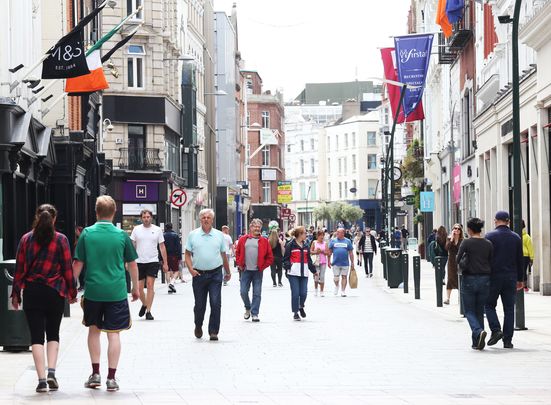As Ireland steps up and accelerates its recovery from the Covid-19 onslaught, and wins a place as 38th safest place in 200 countries battling the pandemic, some prominent medical experts have warned the country may be speeding towards a second wave of the virus.
Pandemic expert Professor Gerry Killeen, who described himself as “shaken,” “very scared” and “shocked,” said the Irish government’s decision to advance the recovery roadmap was like taking “outbreaks 101 and burning it.”
Another expert, former professor of genetics David O’Connell said Ireland does not have the testing and contract tracing system vital to ensure the disease does not get out of control as restrictions are lifted.
Both men were speaking after Taoiseach Leo Varadkar on Friday announced a fast-track procedure out of months of lockdown that started in mid-March.
Read more: Irish politician calls for anti-racism protesters to have COVID-19 payment cut
Around the same time a report on 200 countries and regions from the Deep Knowledge Group, a consortium of companies and non-profit organizations, placed Ireland as 38th safest ahead of the U.S. in 58th and the United Kingdom in 68th. Switzerland was first.
A five-stage re-opening process in the Republic, with new steps every three weeks, starting on May 18.
Public observation of the restrictions was so successful with numbers of COVID-19 deaths and illnesses falling so fast that Varadkar said he is merging the lockdown exit from five stages into four and the final phase will now start on July 20 instead of mid-August.
As stage two began on Monday this week, with all retail shops opening across the Republic – Northern Ireland will follow suit this Friday -- and people allowed to travel throughout their own county and up to 20 kilometers when entering another county, and meet more friends – at a social distance – Killeen and O’Connell expressed their concerns.
Read more: Coronavirus live updates from Ireland
Killeen, the Axa research chair in applied pathogen ecology at University College Cork, said that even if the country was still on the original five-phase road map a second virus wave was “guaranteed.”
He told the Irish edition of the Times of London, “We are seeding it as we speak. The only question is how big the next wave will be.”
Killeen, who worked in tropical medicines in Tanzania for 16 years and more recently helped to tackle the Latin American Zika pandemic in Haiti, added, “To say that I have concerns would be very mild. I’m badly, badly shaken, very scared. That doesn’t happen easily because I fly into situations that most people will never see.”
He predicted that the “wheels will squeak” during phase two, “wobble” on phase three, and fall off by phase four “if we get that far.”
O’Connell recently retired pro-chancellor of Trinity College Dublin, wrote in the Irish Mail on Sunday that more cases of COVID-19 are inevitable.
He wrote, “I simply do not believe that we have a system in place to deal with that sort of explosion and there will be a whole series of mini-explosions.”
From June 15, relatives will be allowed for the first time since March to visit patients in nursing and care homes, a sector that suffered more than 50 percent of 1,683 deaths in the Republic.
From last Monday, June 8, people over 70 or the medically vulnerable could have a small number of visitors in their homes for the first time since lockdown; all retail stores reopened; funeral attendances increased from 10 to 25; public libraries, playgrounds and outdoor camps for children resumed; and horse-racing re-started, although with only trainers, jockeys and officials allowed on to the course in front of empty stands.
Hotel re-openings have been brought forward to June 29, prompting a re-think in Northern Ireland where the date was last week fixed for July 20.
In his announcement Varadkar told the nation, “Summer is not lost and this can be a summer of hope if we keep the virus at bay.”
Read more: COVID-19 survivors put a dream Irish cottage up for auction




Comments